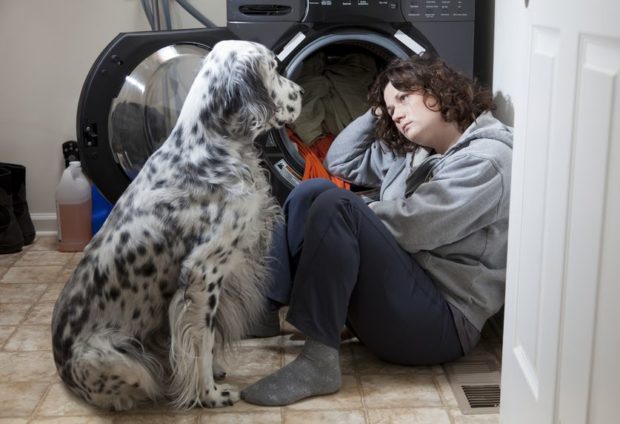
When talking about emotional and mental illnesses, we usually think of the most common ones which are anxiety, PTSD, depression, schizophrenia, and bipolar disorder.
There is in fact a mental illness, that we know exists, and that is actually very common in people nowadays, but that we seem to push somewhere deep in our minds. As you may have already guessed, we are talking about eating disorders.
The dynamic of our lives and the standards we are daily trying to fit in to be accepted by society can make us go to extremes. These, often affect both our minds and bodies.
Today we will talk about our beloved paw friends-dogs, and how they can help individuals, suffering from eating disorders.

Eating Disorders-Causes
Eating disorders are a type of mental illness, whose exact causes are still unknown. However, similarly to other mental disabilities, there are two factors, that are essential for developing this illness:
Genetics
Our genetics determine what health conditions we may be predisposed to, including eating disorders.
Biological Factors
By “biological factors” it is meant any changes that can occur in brain chemicals. These changes can contribute to developing eating disorders.
Potential Triggers/Risk Factors
The Presence of Other Mental Illnesses
If a person is already dealing with a mental issue such as panic attacks, anxiety, depression, obsessive-compulsive disorder, etc., the chances for them to develop eating disorders increase.
Family
People whose family members such as parents or siblings have eating disorders are put at a higher risk of developing this illness.
Stress
Stress can be considered a common trigger for many health conditions. Whether it will be related to work, or problems among family members and friends, the higher the stress is, the higher the risk of developing health conditions is.
Diet
We all support or at least try to support a healthy lifestyle. Leading a healthy lifestyle is related to many factors, and eating food of high quality is one of the most essential ones.
Sometimes our willingness to remain fit may cause us to take drastic decisions, such as eating too little. When this behavior goes to extremes, namely starvation, we put our health at risk. Developing eating disorders is a possible outcome of the extremes we put our bodies on.
Bullying due to the weight
Unfortunately, many people become victims of bullying due to their weight, which can cause them serious emotional damage. It can lead to further complications such as eating disorders. Sometimes it is even our close ones who make us feel insecure about how we look…

Types of Eating Disorders
We will list below some common types of eating disorders:
Anorexia Nervosa
It is characterized by attempts to control your weight by eating too little, overdoing exercise, or both.
Bulimia
Typical for this disorder is the loss of control over how much you eat. In order to compensate for this, you take extreme measures to not gain weight.
Avoidant Restrictive Food Intake Disorder (ARFID)
People dealing with this disorder are known for avoiding certain foods, restricting the amount of food, or doing both.
Other Specified Feeding or Eating Disorder (OSFED) and Unspecified Feeding or Eating Disorder (UFED)
These are very common eating disorders, that have replaced Eating Disorder Not Otherwise Specified (EDNOS). They encompass people whose diagnosis does not exactly meet the criteria for the other types of eating disorders.
Binge Eating Disorder (BED)
This is an eating disorder that is characterized by recurrent episodes of eating a lot of food very quickly to the point of feeling discomfort. Typical is the feeling of shame and distress after that.

The Role of Service Animals in the Lives of People Dealing with Eating Disorders
First, we would like to note again that eating disorders are a mental illness and not just a problem with the person’s diet. These disorders can have serious complications and can even cause death.
Having said that, there is a type of service animal, that helps people coping with mental disabilities- Psychiatric Service Dogs.
Psychiatric Service Dogs (PSDs) can be trained to perform a wide variety of tasks for the benefit of a person with a mental illness. In the context of eating disorders, these can be especially focused on interrupting repetitive harmful behaviors.
PSDs can be trained to recognize and respond to verbal and non-verbal cues (the so-called “tells”). By “tells” are meant any type of behavior that a person exhibits such as a certain way of breathing, body signs, or a phrase when they are having an episode.
Tactile stimulation and Deep Pressure Therapy are the most common tasks that Psychiatric Service Dogs perform for the benefit of their handlers/users. These tasks can help reduce emotional overload and distress and bring a feeling of calmness, safety, and warmth.
If an individual with an eating disorder is going through medication treatment, a PSD can be taught to bring medication or other helpful items.
Reminding their handler/user to take medication or eat at regular intervals are further helpful tasks that service animals can do.
A service dog can also be trained to block distractions so the handler/user can eat normally.
The assistance of a service animal can tremendously benefit the emotional and physical health of a person, and improve their social, and cognitive skills as well as their coping mechanisms.
Support animals help people regain their self-esteem, feel loved, and confident, and be more open to other people. Not to mention that taking care of a dog and service animal, in particular, is related to many activities such as feeding the dog, brushing them, bathing them, playing with them, socializing them, etc. All these activities require a certain level of consciousness, responsibility, empathy, and physical work.
How to Get a Service Dog for Eating Disorders?
In our opinion, the best way to do so is to get your pet dog trained to assist you or train them yourself. The reason why we think it is the best decision is very simple-emotional bonding.
Yes, you can reach out to organizations/schools that provide trained service animals, but having a strong emotional bond with your dog is crucial for service dog training for mental illnesses. Service dogs need to be highly attuned to their owners’ needs and be able to recognize changes in their mood, behavior, or emotions.
Mental illnesses are complex conditions that affect people differently. Even within the same diagnosis, symptoms can vary from person to person. This requires service animals assisting with mental disorders to know their owners very well in terms of behavior and triggers and be attuned to them.
A holistic approach that considers the person's individual circumstances and goals is often the most effective way to help them manage a mental illness.












